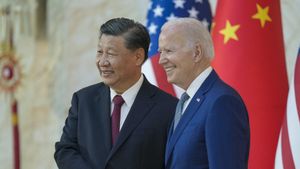Plastic pollution has become one of the major environmental challenges of our time, with its impact being felt globally. Numerous initiatives are underway, both at the international and local levels, to combat this ever-growing problem.
The World Bank reports startling statistics, estimating each person generates about 1.6 pounds (0.74 kilograms) of plastic waste per day. This staggering amount highlights the need for urgent global action and responsibility.
At the forefront of combating plastic waste is the Biden administration, which recently introduced the first US plan to tackle plastic pollution. This strategic blueprint outlines five key areas aimed at reforming plastic production, product design, waste management, and more.
A significant part of this strategy includes developing federal standards for measuring microplastics, tiny plastic fragments found everywhere from the air to our drinking water. Until now, there hasn’t been uniformity in measuring these pollutants, making it hard to assess their impact.
California is leading by example by initiating its microplastic monitoring program, which has sparked interest from other states. The federal strategy hopes to standardize methods for assessing these particles, which could lead to more effective regulation.
Another innovative proposal within the plan is the extended producer responsibility (EPR) legislation. Under this system, producers would bear some responsibility for the lifecycle of their plastic products, promoting more environmentally friendly designs.
Currently, only about 5% of US plastic waste is recycled, prompting calls for laws mand producing companies accountable for their waste. The approach encourages manufacturers to take proactive measures to reduce plastic use and improve recycling processes.
On the international stage, representatives from 175 nations are working toward creating a binding treaty to combat plastic pollution. The aim is for this treaty to be finalized by late 2024, focusing on both reducing plastics production and effectively increasing recycling rates.
Another significant aspect of the global effort is to evaluate and limit the production of plastics. Countries involved, including Norway and Rwanda, advocate for reducing plastic production by 40% below 2025 levels by 2040, which is still under discussion.
While some industries argue against such measures, claiming it could increase costs, environmental advocates see the necessity of these changes. Groups like the World Plastics Council argue for increased recycling and using more recycled materials instead of capping production.
Across the globe, local initiatives are also making impactful changes. For example, volunteers from the CraSea Cleanupper group actively clean the remote beaches of Hong Kong, focusing their efforts on areas neglected by larger cleanup initiatives.
Established by Yeung Ting, the group works to remove trash and raise awareness about waste management. Their efforts have been particularly effective at identifying hotspots of litter accumulation using satellite imagery.
During their clean-ups, volunteers have noted the alarming amount of plastic bottles and other waste found along the shorelines. Last year alone, they collected over 38,000 plastic bottles, underscoring the overwhelming pollution issue within the community.
Yeung emphasizes the need for both reducing waste at its source and improving community awareness. Through education and involvement, she hopes more individuals will participate in the fight against plastic pollution.
While local actions are pivotal, governments also play a significant role. For example, Indonesia’s Finance Ministry recently decided against implementing an excise tax on plastic products, instead focusing on taxing sweetened beverages to improve public health.
This decision reflects the complex challenges faced by governments when addressing environmental concerns. The growing diabetes rates among Indonesians had become too pressing to ignore, showing how intertwined public health and environmental issues can be.
Nonetheless, the cancellation of the plastic excise plan raises questions about the commitment to combating plastic pollution. Environmental advocates have voiced their concerns, urging policymakers to maintain focus on effective solutions for waste management.
The current approaches taken by both governments and grassroots organizations highlight both challenges and opportunities. With increasing awareness and combined efforts at various levels, there is hope to significantly combat the plastic waste crisis.
Research and advocacy will continue to play important roles, as communities and nations work together. Effective change requires not just policies but also active participation from individuals globally.
Whether it's standardizing microplastic measurements or promoting environmentally responsible products, every effort counts. The time for action is now, and the world must unite to mitigate the growing plastic pollution.
Families, communities, governments, and organizations everywhere are recognizing the urgency of the issue and responding accordingly. Together, they can create pathways to cleaner, healthier environments.
Although both local and international efforts vary widely, it is clear progress is being made. The increased focus on plastic waste should encourage innovative solutions and sustainable practices for future generations.
Through collaboration and steadfast commitment, the tide against plastic pollution can be turned. While significant challenges remain, the combined determination offers a beacon of hope for our planet's health.
Each action, big or small, contributes to the larger fight against plastic waste. It is this shared responsibility and engagement of all sectors of society where true progress lies.
Let this be the outset of transformative change across the globe, as we collectively work toward responsible waste management and healthier ecosystems.



